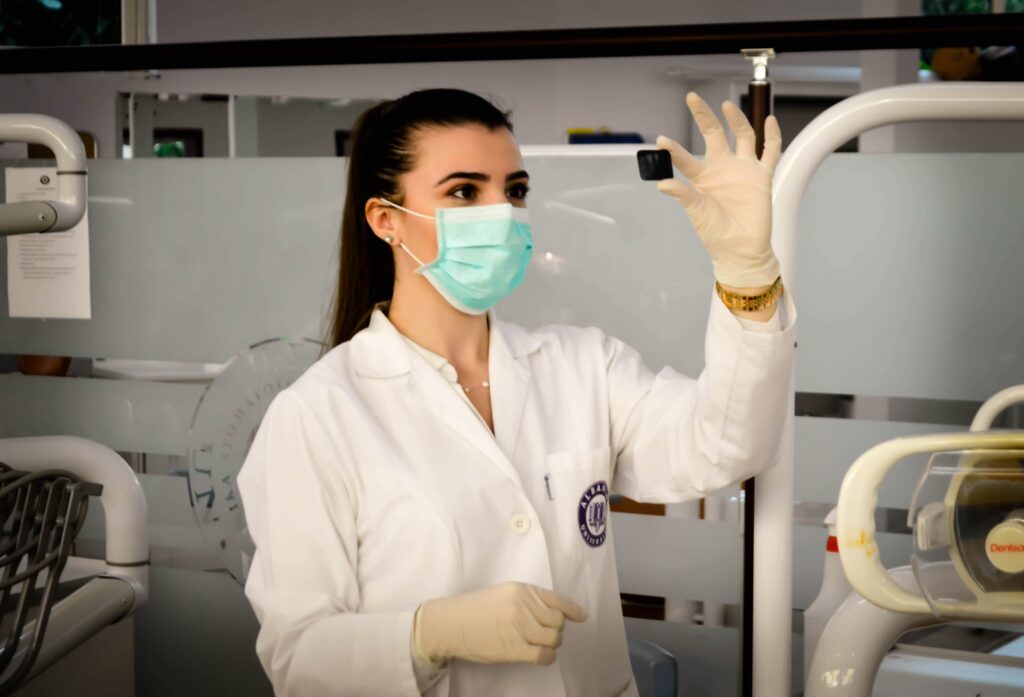
Healthcare can bring a sense of risk and uncertainty because patients rely on their medical professionals intentions and competence. This makes it critical for medical workers to build trust in their patients.
According to the Oxford English Dictionary, trust is the “firm belief in the reliability, truth, or ability of someone or something.” That’s exactly what healthcare workers are trying to cultivate with their patients – belief in their abilities and their reliability to provide the best care.
Building Trust with a Custom White Coat
Beyond these key components of building trust with patients, evidence shows that what medical professionals wear also affects how patients view them. Their attire is linked to patients’ overall satisfaction with care and how they perceive their medical professionals. Not only that, but a patient’s first impression of his or her physician is based upon the physician’s communication skills, as well as personal attributes such as grooming and cleanliness.
Studies published in the Journal of Hospital Medicine show that patients prefer formal attire, displaying they trust medical professionals more when wearing the proper, custom white coat. Medical professionals wearing white coats are perceived as more approachable, knowledgeable, and trustworthy.
Why Building Trust is Important
It has been shown that high levels of trust are linked to multiple benefits, such as greater acceptance and adherence to treatment, reduced anxiety related to medical care, and improved perception of receiving treatments. When patients trust their medical professionals, they’re more likely to open up and disclose essential information. This leads to improved quality of interactions and shared decision-making.
However, it’s not just cultivating public trust that’s important — it’s fostering a substantial amount of it. For example, a report from 2015 completed for the General Pharmaceutical Council looked at pharmacists in Great Britain. They found that 87% of people surveyed said they trusted their pharmacist either a fair amount or a great deal. Only 39% responded that they trusted their pharmacist “a great deal.”
Medical professionals don’t just want to build fair trust; they need to foster that substantial degree of trust with patients. When they recommend a treatment or provide advice, patients must truly believe medical workers provide them with the best care possible.
What Influences Trust in Medical Professionals?
What makes patients trust their healthcare professionals? Individual studies point to many different factors that influence trust in medical professionals, but there are a few essential elements of trust that are key, including:
- Honesty. Medical professionals are expected to act with integrity and honesty, ensuring that patients have confidence their healthcare professional will advise them properly and work in their best interest. Anytime patients feel that they’re being lied to in any way, a physician loses credibility and respect.
- Competent communication and social skills. Communication must be adapted to meet the patient’s needs, and this involves being skilled in both verbal and non-verbal communication. Communication goes beyond speaking to a patient; it involves actively listening, too. Medical professionals can demonstrate active listening by paraphrasing, summarizing, reflecting, and clarifying patients’ words.
- Confidentiality. When patients confide in medical professionals, they need to know they can count on privacy. Breaching confidentiality harms the patient relationship and breaks trust. While confidentiality is legally required, reassuring patients that their privacy and dignity will be upheld is critical.
- Care and respect. Showing care and respect are crucial to building trust, too. While it’s essential to maintain professional boundaries, patients deserve to be treated with respect, dignity, and compassion. A caring attitude goes a long way to building a respectful relationship.
- Knowledge. Working as a medical professional requires lifelong learning, and being educated in the field of practice is a key step to gaining patients’ trust. Patients feel secure and confident when a knowledgeable physician provides advice, but this also involves being open, honest, and willing to admit mistakes.
The foundation of trust in a physician-patient relationship is crucial. Wearing a white lab coat is the symbol of professionalism that makes for a fantastic first impression for patients. By donning a visual representation of that trust — a formal, custom white coat — medical professionals take another step in creating strong patient connections that lead to improved patient outcomes.
Also Read
- lifetime-fitness-membership-prices-locations
- membership-levels-at-lifetime-fitness
- everything-you-need-to-know-about-la-fitness
- 40 Junk Food List | Healthy And Unhealthy Food
- Lifetime Onyx Membership: What Is It- Advantage & Price
- What is Ursolic acid? Benefits, Side effects and Supplements
- 5 Best Ingredients to Increase Testosterone Levels Naturally
